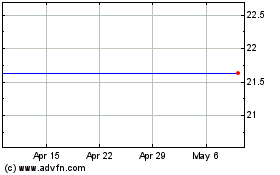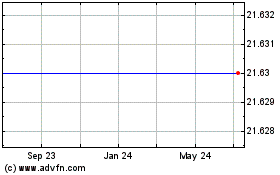Japan Chides Canon Over Toshiba Deal -- WSJ
July 01 2016 - 3:03AM
Dow Jones News
By Megumi Fujikawa
TOKYO -- Japanese regulators warned Canon Inc. that the way it
acquired Toshiba Corp.'s medical-systems unit potentially violated
the law, but said the deal can go ahead.
The rules are ambiguous, regulators said Thursday, but they
added that any future transaction such as the one between Canon and
Toshiba could be subject to a criminal complaint.
Fujifilm Holdings Corp., the loser in bidding for the unit,
expressed displeasure at the decision.
At issue is the structure of the deal, reached in March and
valued at Yen665.5 billion ($6.5 billion). Canon paid the purchase
price up front -- Toshiba, having incurred sizable losses after an
accounting scandal, needed cash ahead of the March 31 end of its
fiscal year -- but didn't immediately receive shares in the medical
unit.
Instead Canon got warrants entitling it to the shares once the
deal received regulatory approval. Until then, the shares would be
parked in a special-purpose company with just Yen30,000 ($292) in
capital.
Japanese law says that a company planning an acquisition that
raises antitrust issues must report its plans to the Fair Trade
Commission before an agreement. The commission said Thursday that
the Canon-Toshiba arrangement could be viewed as skirting the law
by effectively doing the transaction first and telling regulators
later.
Takeshi Shinagawa, director of the commission's
mergers-and-acquisitions division, said it was the first time this
technique had been used in Japan, and there is no clear rule
against it.
"We decided to make an announcement about the warning to let
everyone know that it is not acceptable, so the same method won't
be used in the future," Mr. Shinagawa said. He added that companies
have asked the FTC whether it passes muster.
Canon said it took the warning seriously. "We will firmly follow
the law while improving transparency of our business," the company
said in a written statement.
Toshiba, which also received a warning, said it didn't think
there was anything illegal about the deal, but added that it would
continue to work on improving compliance.
The medical-equipment business was one of Toshiba's few steady
profit makers. The business makes and supplies equipment such as
X-ray machines, computed tomography scanners and
magnetic-resonance-imaging systems.
The unit's sale drew wide interest, including from U.S.
private-equity firms. Ultimately, the bidding came down to Canon,
which is seeking growth drivers as its camera business
deteriorates, and Fujifilm, which has been expanding its medical
business.
That made it a battle between two of Japan's most prominent
executives: 80-year-old Fujio Mitarai, who has led Canon for two
decades, and Shigetaka Komori, 76, who is credited with keeping
Fujifilm prospering even after its film business withered.
Fujifilm responded bitterly after it lost, calling the deal's
structure "extremely tricky" and saying Canon treated the FTC with
a lack of respect that "would be unthinkable for a company such as
ours that has a policy of acting openly, fairly and clearly."
Fujifilm said Thursday it isn't satisfied with the FTC's
decision to let the deal stand: "We demand an explanation for why
the scheme was allowed this time when it is not going to be
accepted in the future. It was an unfair fight for us."
Write to Megumi Fujikawa at megumi.fujikawa@wsj.com
(END) Dow Jones Newswires
July 01, 2016 02:48 ET (06:48 GMT)
Copyright (c) 2016 Dow Jones & Company, Inc.
Canon (NYSE:CAJ)
Historical Stock Chart
From Mar 2024 to Apr 2024

Canon (NYSE:CAJ)
Historical Stock Chart
From Apr 2023 to Apr 2024
